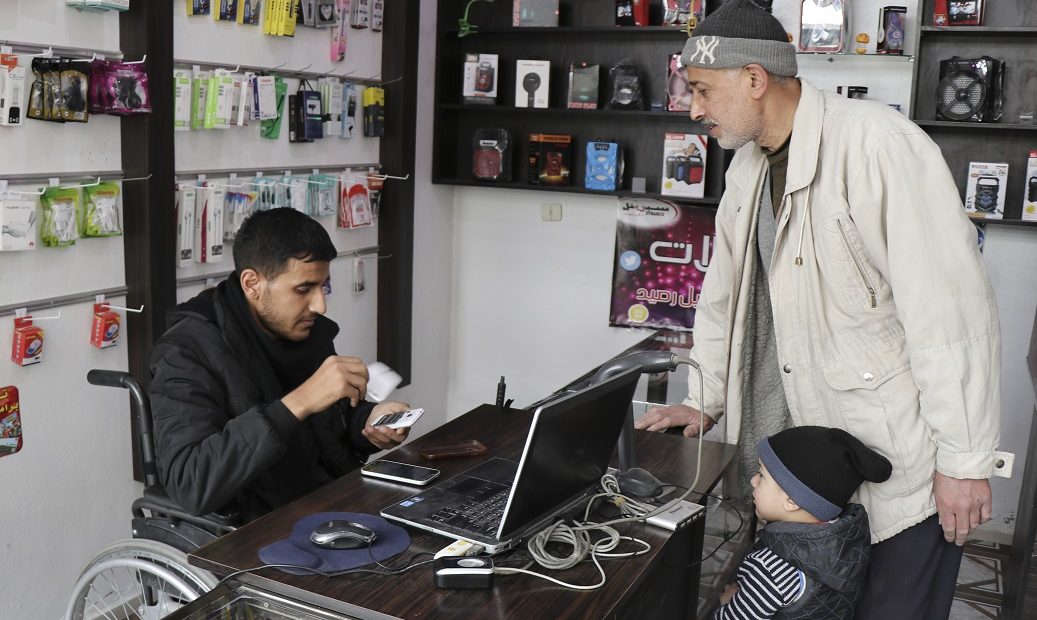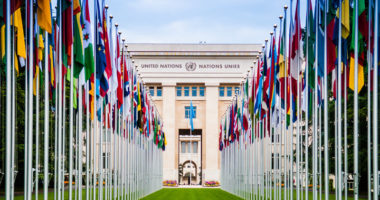Mobile phones are a powerful tool for participation and engagement in humanitarian crises. Responsible public/private partnerships are increasingly unleashing their potential.
In this post, part of a new series on Cybersecurity and data protection in humanitarian action, Susanna Acland and Barnaby Willitts-King from the GSMA Mobile for Humanitarian Innovation programme outline the private sector perspective on this important trend.
Participation lies at the heart of effective humanitarian interventions, enabling affected communities to voice their needs, aspirations, and preferences. As well as delivering assistance through mobile money and providing information on needs, the reach of mobile phone networks has opened unprecedented avenues for two-way engagement through call centres, feedback mechanisms, social media and more recently, chatbots.
In an increasingly connected world, the role of technology and the private sector in humanitarian efforts is critical. The mobile industry’s responsible collaborations with humanitarians can foster enhanced participation and inclusion.
The UKAid-funded Mobile for Humanitarian Innovation (M4H) programme at the GSMA catalyses partnerships by bringing together mobile operators and humanitarian partners; invests in innovation through a humanitarian innovation fund; unlocks policy barriers with advocacy efforts; and builds a learning and research agenda to inform the future of digital humanitarian response. It has reached over 11 million people with improved access to and use of life-enhancing mobile-enabled services during humanitarian preparedness, response and recovery. Through its humanitarian innovation fund the programme provides grants and corresponding mentorship to support innovative digital solutions, such as the SOLIS bot detailed below, designed to aid crisis responses and build resilience against humanitarian challenges.
Responsible partnerships are critical for inclusion. However, the potential of mobile technology to promote inclusion must be balanced against concerns of exclusion, particularly when not all members of a community have access to or familiarity with such platforms. Furthermore, the ethical dimensions of these partnerships warrant careful consideration, so that different approaches and objectives align to support the needs of those they intend to serve.
Addressing concerns from humanitarians about private sector involvement
When partnering with the private sector, humanitarians are required to balance their principles and the motives inherent to private sector engagement – and vice versa. A primary concern involves potential exploitation of those in crisis. Humanitarians worry that commercial objectives could compromise the ethical underpinnings of aid efforts, shifting focus from welfare to financial gains. This tension is further exacerbated by ethical concerns regarding the use of technology, for example data misuse and AI biases. The data-rich environment created by mobile technologies raises concerns about privacy breaches and potential commodification of sensitive information. The GSMA has frameworks and policies for its members on ethics, privacy & data protection, including the AI ethics playbook. These are relevant to humanitarian contexts, but additional tailored approaches are needed.
The GSMA’s experience detailed below shows that strong partnerships are key to addressing these concerns and maximizing the opportunity of humanitarian-private sector collaboration.
How the GSMA supports responsible humanitarian programming
M4H undertook an internal review of its approach to ethical digital programming and is incorporating suggestions from experts from The Engine Room non-profit organization into its workstream processes – including forming new partnerships. Our approach is guided by five principles, tailored to our work, that provide a framework within which our activities operate and which help guide our decision making:
- Necessity: considering whether technology is the right solution. The point of it is not to avoid the use of technology altogether but ensure that M4H is identifying the correct and appropriate circumstances for deploying technology and digital humanitarian action.
- Community: helps orient digital humanitarian action by centring it on the communities who stand to be most impacted – both positively and negatively – by any initiative.
- Equity: Being intentional about the ways power can shape interactions requires a practice rooted in equity, one that is proactive in undoing these structures of oppression and identifying the hidden ways power may permeate digital humanitarian action.
- Intentionality: having purposefully designed, fully considered initiatives that have interrogated the possible risks and harms of any action.
- Responsibility: taking responsibility for the impact of our work. If intentionality is about clearly thinking through risk and harm, responsibility is concerned with how we undertake digital humanitarian work given that risk and harm is often embedded within the use of technology.
M4H focuses on partnerships that work to address community needs, putting community voices at the heart of humanitarian services. When forming new partnerships we undertake an ethical review process, developed in accordance with these principles to ensure that these dimensions have been interrogated.
In addition, our research outputs inform and enable humanitarian partners to do the same. Much of our research, such as ‘The Digital Worlds of Displacement-Affected Communities’, incorporates human centred design methods to explore how refugees and host communities access humanitarian services and how their personal interests and activities allow these communities to create their own digital worlds. It also explores risks and barriers to inclusion. This can then inform humanitarian services based on the needs and preferences of the communities they are intended to serve.
The Humanitarian Connectivity Needs and Usage (CoNUA) toolkit, developed in partnership with REACH and supported by the inter-agency Emergency Telecommunications Cluster (ETC) enables humanitarian partner organizations to measure access to, usage of, preferences regarding mobile phones as well to understand people’s digital skills and concerns they may have around the use of digital services. This means humanitarian organizations can make decisions based on strong evidence as opposed to anecdotal accounts about mobile penetration, access, use and preferences in humanitarian contexts.
The SOLIS Bot, a mobile-enabled WhatsApp chatbot designed for Syrian refugees in Lebanon shows how such partnerships can be built
The M4H programme at the GSMA fosters partnerships with organizations that consciously address ethical concerns and promote inclusive and participative humanitarian action. This is why we chose to partner with Solidarités International to support the SOLIS Bot, an innovative WhatsApp chatbot that provides two-way communication for refugee communities in Lebanon to communicate with humanitarian organizations via their mobile devices. It highlights essential principles that underpin successful collaborations, emphasizing the need for localised, human-centred design and assessments of inclusion and exclusion risks. Twilio partnered with Solidarités International to allow messaging via WhatsApp and the ability to send multiple messages.
Whilst this was largely a commercial relationship, their non-profit programme meant that Solidarités International benefited from free credits at the beginning before committing to paid services, as well as access to forum of other customers. Solidarités International received a grant and technical assistance from the GSMA Mobile for Humanitarian Innovation Fund to test and scale the chatbot. They also received an additional COVID-19 adaptation grant to adapt SOLIS Bot to the needs of the pandemic. The chatbot reached more than 40,000 people.
How SOLIS bot mitigates ethical and exclusion concerns
The SOLIS bot is an example of how the humanitarian and private sector can work together to implement solutions that increase participation and engagement. Through funding and technical partnerships, effective mobile solutions have been developed in many different humanitarian contexts. When developing these solutions, it is important to take into account and mitigate ethical concerns around AI bias, culture/language sensitivities and data protection:
1. Addressing potential AI bias
There is often concern that human biases can be introduced into chatbots through the design of algorithms and the assumptions by coders of the needs of the users, which can impact the messages and information that is sent. In order to acknowledge or avoid the potential biases in the bot’s algorithm, the SOLIS bot was designed using a Natural Language Understanding (NLU) module in order that users contribute to content creation and language understanding. This component empowers the bot to comprehend human expressions and decipher the underlying intent in spoken or written phrases.
Potential bias may arise due to cultural disparities and misunderstandings. The ‘building with the local communities’ approach adopted by the project is pivotal in addressing this concern. Employing machine learning, the bot learns and enhances its accuracy through interactions with users. Feedback mechanisms such as “Was this content useful?, Yes/No” act as guiding points.
The SOLIS bot’s capacity to store and comprehend various phrases and terms is expanded, enabling it to proficiently address multiple ways of seeking contact details for the Red Cross across different languages and dialects.
Leveraging Machine Learning and user interactions, the bot evolves and responds, with insights from a broad user base. This dynamic learning process shapes the bot’s development, striving to minimize algorithmic biases in its functioning.
2.Taking a user focus to address cultural and language sensitivities
The development of the SOLIS bot initially targeted the Syrian refugee population in Lebanon, focusing on cultural and language sensitivities before being adapted to other contexts and used by four other NGOs in Lebanon with different populations. To navigate the issue of cultural and/or language sensitivities the project team undertook a comprehensive approach to ensure relevance to the target users. This involved conducting focus group discussions and content design in Arabic, tailored to the Syrian dialect. Extensive site visits were made to identify user information needs and daily content consumption patterns. Iterative tests and feedback loops were employed to ensure the language used resonated with the end users.
To enhance the bot’s performance, a Community Manager was brought onboard. This individual played a pivotal role in continually refining the bot’s language and user-friendliness. Throughout the launch phase and the project’s duration, various adjustments were implemented based on user feedback. Notable improvements included the incorporation of emojis and voice notes recorded in a relevant dialect to accommodate users with limited literacy skills. The success of the SOLIS bot was attributed to its user-centric design approach, underscoring the importance of catering to the cultural and language preferences of the target audience.
3. Safeguarding data
Solidarités International places a strong emphasis on data protection and security across its digital projects. The organization follows a “protection by design and by default” approach, prioritizing user privacy. In the context of the SOLIS bot, stringent data protection measures are adhered to, ensuring users’ rights are safeguarded throughout data management processes.
When constructing forms and content, Solidarités International is meticulous in collecting only essential data required for service completion, always striving for anonymity. The guiding principle is to minimize data collection to the extent that the best way to protect data is by not possessing unnecessary information.
Adhering to a “by design” philosophy, all Information Management tools, including the SOLIS bot, prioritize minimalistic data flow. The organization actively seeks systems and software that enable local server installation or local data downloading, bolstered by robust firewalls. The intent is to mitigate online data transmission and storage, reinforcing security. While the SOLIS bot can be cloud-deployed, Solidarités International has chosen a local server deployment to maximize data protection.
Conclusion
The SOLIS bot shows an example of effective collaboration between the humanitarian and private sector to implement a solution for increasing participation and engagement. Through similar funding and technical partnerships, effective mobile solutions have been identified and developed in many different humanitarian contexts, whether for forcibly displaced people, to prepare and respond to disasters and the impacts of climate change, or for other protracted crises. Taking into account and mitigating ethical concerns is fundamental to such responsible partnerships. As needs continue to grow, the mobile industry is doing its part in working with the humanitarian sector to address these and create lasting shared value partnerships.
See also:
- Ed Millet, Deploying OSINT in armed conflict settings: law, ethics, and the need for a new theory of harm, December 5, 2023
- Joelle Rizk, Sean Cordey, What we don’t understand about digital risks in armed conflict and what to do about it, July 27, 2023
- Fiona Terry, Fabien Dany, Harnessing the power of Artificial Intelligence to uncover patterns of violence, May 25, 2023
- Kubo Mačák, Tilman Rodenhäuser, Towards common understandings: the application of established IHL principles to cyber operations, March 7, 2023







Comments